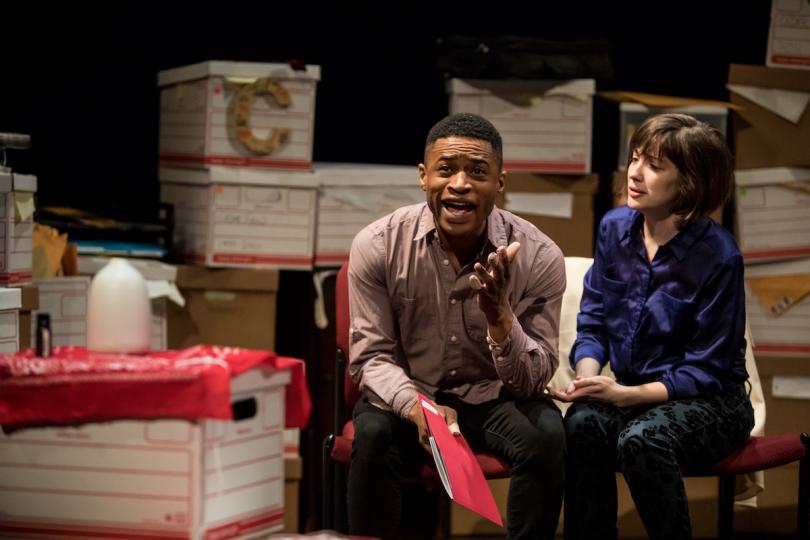Human | Ambiguity

Luna Gale, the titular child of Rebecca Gilman’s play, is rarely shown onstage. Instead, the adults that will decide her fate -- her mother and father, social worker, grandmother, and grandmother’s pastor -- take center stage in a play that frankly, if not always gracefully, looks at our child protective services and our assumptions. It challenges us to do better. It makes complete sense that Underdog Theatre, a company that prides itself in telling stories that are often relegated to the margins would tackle this. The spare set, which consists of two circular “rooms” created out of stacks and stacks of filing boxes, is a bit on the nose, but nods towards the bureaucracy which runs through the show.
The play has two interconnected arcs: the first is summarized in all of the synopses of the show: after failing to properly respond to Luna’s medical needs, Luna’s young, recently-addicted-to-meth parents Karlie (Briana Patnode) and Peter (Kory LaQuess Pullam, also the founder of Underdog Theatre) end up in a struggle to win Luna back from Karlie’s very religious mother, Cindy (Megan Kelly Hubbell). With the help of her pastor (Dario Tangleson), Cindy attempts to convince their caseworker Caroline (Jodi Kellogg) that Luna is better off with her.
The second arc deals with Caroline’s own neuroses and her ever-fraught relationship with her job and her supervisor Cliff (James Rodriguez), and their mutual disdain for one another. Caroline thinks Cliff is an overly budget-conscious political climber with an eye towards efficiency; his opinions run counter to Caroline’s gut instincts and her countless years of experience. Cliff finds Caroline overly maternal to her clients to the point of censure, and cannot forgive her for letting her old supervisor Mimi “lose” children (this is right before Mimi committed suicide).
Part of what makes Caroline and Cliff’s interactions so interesting is that, on a fundamental level, they are each worried the other is right: Cliff worries that he is not doing enough for the agency, and Caroline does feel responsible for not stepping in with Mimi sooner. Lurking just under the surface is the cold truth of it -- both are culpable, but they are also overworked in a system that cannot provide basic things (like rehab treatment for addicts). It is hard to know how they could actually improve upon what they are currently doing; both are treading water in a system that fails so many.
This ambiguity is what I found most compiling about Gilman’s script. Because it puts messy flesh on often invisible truths and structures, Luna Gale is imperfect but powerful. You feel sympathy for the young parents, and understand how they got into their mess, but you are not sure the state has no business getting involved in their lives; without rehab or proper therapy (neither of which the state seems capable of providing) you are not sure that they will be able to create the best environment for their baby.
Kellogg’s Caroline is a high-energy whirl of seeming competence and compassion, who nevertheless always speaks as though she is the only adult in the room. She patronizes those she helps, all while truly caring about them. We have all met (and been helped by) versions of this exact woman, and Kellogg’s speech patterns and mannerisms will undoubtedly remind you of them. Meanwhile, Cindy and her pastor want to make Luna’s life better, but their focus on Luna obscures the compassion they should feel towards Karlie and Peter.
Despite the play’s evident concern with analyzing child-welfare services, what stuck with me most is the script’s reliance on sexual violence to drive its plot forward. Perhaps this isn’t so surprising for Gilman (a non-trivial amount of her works employ themes of sexual and emotional exploitation), but much of the script had me at the front of my seat, unable to look away, all while feeling ashamed of my own rubbernecking. This play made me question internal assumptions, and I think that is what really great theatre has the power to do. Its constant use of sexual violence was both effective and suspect, and left me feeling like Luna Gale exploited several of its characters, and in particular Karlie. Indeed, I think that may be the whole point.
In one memorable and distressing instance, Caroline advises Karlie to lie in order to maintain her parental rights over Luna Gale. If Karlie can convince the system that she herself was abused as a child by her stepfather, and that Cindy, her mother, knew about it and did nothing to stop it, the system will be unable to grant Cindy custody over Karlie’s child. If Cindy refuses to admit that the abuse happened, she will be found unfit; it is the perfect catch-22. Caroline’s advice in this instance is cold and calculating; she knows exactly what she is doing. Patnode does a great job in this scene, which is one of the few were we really start to see beyond the facade Karlie has been maintaining for a long time.
After Caroline realizes that Cindy is so religious, she unreflectively calls Cindy a “crazy Christian” in front of Cliff. Cliff, it transpires, is quite devout, and this proclamation confirms all the negative things he has always thought about Caroline. In an impolitic move, Cliff and Pastor Jay ambush Caroline in her office. They insist upon talking about Luna Gale’s case, despite Caroline’s repeated reminders about the impropriety of talking about her clients with the pastor. Part of what makes this scene so cringeworthy and unsettling is that, at least for me, Caroline’s recent advice makes her feel morally suspect, and maybe not as steady as we are originally lead to believe. The later-revealed fact that Karlie was actually assaulted by her stepfather, and this was correctly predicted by Caroline, still didn’t make me feel better about Caroline’s willingness to use Karlie’s trauma like a cudgel. For me, this seems to cross a pretty clear ethical line, but again the power of this script is the ambiguity; perhaps, when everything is against you, it makes twisted sense to instrumentalize your own trauma to keep what you love.
When Caroline starts telling Pastor Jay and Cliff that part of the reason she wants to punish Cindy is because Caroline's own mother looked the other way when her father sexually assaulted her, there is unavoidable tension -- did this assault really happen, or is Caroline making up yet another story in order to placate these men and continue to get her own way? Can we trust Caroline? Is she a reliable narrator? Can we actually trust her gut? Am I, in the audience, a horrible person for being unsure of her? That final question is what I consider to be the real triumph of this script. While I personally have serious qualms about using sexual assault in this instrumentalized way (perpetuating myths about women lying about sexual assault is a huge problem in our society and there is a fair argument to be made against Gilman for employing it in this manner) allowing Caroline to be so painfully human underscores the larger, societal questions, assumptions, and problems the script wants to interrogate.
Caroline’s confession of her own childhood trauma leads both men to want to “fix” her by showing her God’s love -- “God cannot love you more than He does this very instant. He will sneak up on you. He'll give you His love whether you want it or not. So be prepared.” In a physically terrifying piece of staging, Caroline sits in a chair between the two standing men, as their talon-like hands go over her shoulders and hold her in place while they pray over her. Again, Kellogg’s acting is superb. For the first part of the prayer, I found myself almost wondering if this would help--perhaps Caroline’s inner demons might be chased away by faith. But as the prayer goes on, it starts to feel more and more like a violation. She can’t move, she can’t resist-- God is going to come in whether she wants Him or not. Tangleson delivers these lines perfectly, with each sentence building in intensity and tinged with slight hysteria. Eventually even Cliff starts to get uncomfortable, and ushers the pastor out. Kellogg’s Caroline turns to him, vitriol, pain and a bit of triumph on her face, and proceeds to tell him that she has won:
CAROLINE. You asked me what my faith was! So try to fire me. Try to lay me off or even just take me off the case and I will go to the IWC--
CLIFF. Oh come on!
CAROLINE (overlapping). And they will file a workplace discrimination claim and I won't take arbitration. I'll insist on a full hearing in front of the commission and it'll be so ugly, even if you win, you're never gonna make regional director. This is going to haunt you just like that thing with Mimi is haunting me and you're gonna be stuck here forever. With me!
CLIFF. You're insane.
CAROLINE. Like a fox.
It’s a powerhouse performance by Kellogg, and worth the price of admission. Rodriguez also comes into his own during this scene--while Cliff is prideful you can tell he knows he has beaten. Was it worth it to Caroline to use herself and her trama in this way? Perhaps she identifies more with her clients than we can ever know.
Even more suspect and morally ambiguous, near the end of the play, Peter confronts Cindy about Karlie’s rape. It is a very disconcerting scene because Peter tells Karlie’s story in an manner very close to first person. With vivid detail he meticulous sets the scene of where and how Karlie was raped. It is clear that he is telling Cindy because Karlie never did and because he wants her to admit she knew it happened, but the scene reinforces Karlie’s powerlessness. She doesn’t get to tell her story to her mother, instead a man does it for her. Relatedly, it is very unusual to hear words like this coming from a man. On one hand, it made me realize how so many of the stories and narratives around sexual assault are only told by women, even though men are also sexually abused. However, hearing Karlie’s story in Peter’s mouth is hard to swallow, and perpetuates Karlie’s problematic instrumentality in the plot instead of developing her as a character. It is a hard part of the script, and Pullam gives it the right amount of gravitas, but it is hard not to judge Peter for reviling in such lurid details.
This is just a taste of the great acting and moral ambiguity of this play, which needs to be experienced first hand to really understand. It will make you question what you know, and what you want to believe about yourself and others. Do not miss your opportunity to see Luna Gale at the Southern Theatre, where it runs until April 1st.




